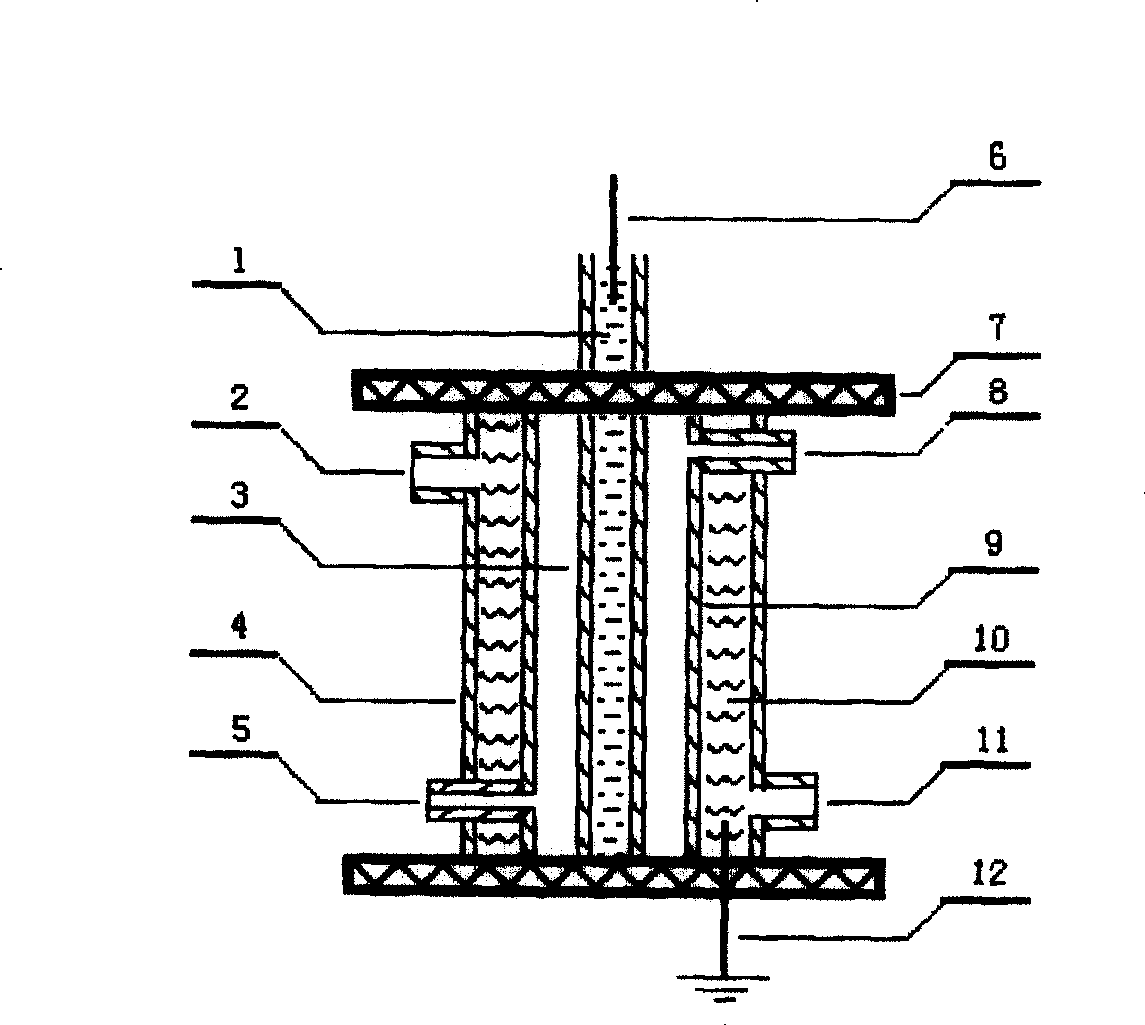Device for preparing propylene by dehydrogenating propane under hydrogen plasma
A plasma and propane dehydrogenation technology, applied in the directions of hydrocarbons, hydrocarbons, chemical instruments and methods, etc., to achieve the effects of cheap and clean raw materials, mild reaction conditions and simple operation process
- Summary
- Abstract
- Description
- Claims
- Application Information
AI Technical Summary
Problems solved by technology
Method used
Image
Examples
Embodiment 1
[0017] Propane gas, purity ≥ 99.99% and hydrogen common cylinder gas, purity ≥ 99% are regulated by a gas mass flow meter, and mixed uniformly in the mixer at a flow rate of 10 ml / min and 10 ml / min respectively, propane accounts for 50%, Then enter the reactor from the raw material gas inlet 5, replace the air for 2 minutes, switch on the AC high-voltage power supply, and carry out dielectric barrier discharge, the raw material gas reacts in the ring gap formed between the inner cylinder glass 3 and the middle cylinder glass 9, and Product gas outlet 8 is used for product detection and analysis. The shell of the device of the present invention is made of oxide hard glass, wherein the outer diameter of the inner cylinder is 6.0 millimeters, the wall thickness of the inner cylinder is 1.5 millimeters, the distance between the ring gap between the inner cylinder and the middle cylinder is 3 millimeters, and the discharge area The length is 150mm. In the device of the present inv...
Embodiment 2
[0019] Repeat Example 1, pass into the aqueous solution containing sodium carbonate 1% (mass ratio) as liquid electrode 10, the reaction result that obtains is: propane conversion ratio is 36.5%, and the selectivity of propylene is 14.8%; Water electrode 1 and liquid electrode When 10 all adopt the aqueous solution containing sodium carbonate 1% (mass ratio), the conversion rate of propane is 43.2%, and the selectivity of propylene is 15.1%.
Embodiment 3
[0021] Example 1 was repeated, when the volume ratio of propane / hydrogen was 60%, the reaction results obtained under different discharge voltages were: when the discharge voltage was 16.6kV, the conversion of propane was 2.4%, and the selectivity of propylene was 6.8 %; when the discharge voltage was 19.2kV, the conversion of propane was 22.0%, and the selectivity of propylene was 9.3%; when the discharge voltage was 25.3kV, the conversion of propane was 35.1%, and the selectivity of propylene was 13.5%.
PUM
| Property | Measurement | Unit |
|---|---|---|
| thickness | aaaaa | aaaaa |
Abstract
Description
Claims
Application Information
 Login to View More
Login to View More - R&D
- Intellectual Property
- Life Sciences
- Materials
- Tech Scout
- Unparalleled Data Quality
- Higher Quality Content
- 60% Fewer Hallucinations
Browse by: Latest US Patents, China's latest patents, Technical Efficacy Thesaurus, Application Domain, Technology Topic, Popular Technical Reports.
© 2025 PatSnap. All rights reserved.Legal|Privacy policy|Modern Slavery Act Transparency Statement|Sitemap|About US| Contact US: help@patsnap.com

